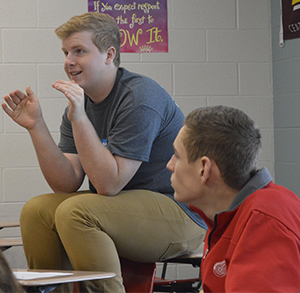Kendall Waldroup speaks softly but listens closely. It turns out that’s all some of her classmates needed.
Students have sought out the Rockford High School sophomore to confide in, knowing she has been specially trained as a person they can go to with their problems.
“Some of them I didn’t really know, but they opened up to me,” Kendall said of the students who met with her in the school counseling office. “It was kind of awkward for them to cry in front of me, but they did. They just kind of vented to me.
“A lot of them a few days later came back to me said, ‘Thank you; that actually helped.’ They told me their problem was solved and everything was a little bit better.’ “
Kendall is one of 13 students serving as Rockford High School Peer Listeners, a new program that grew out of two students’ desire to help meet the mental-health needs of their school mates.
The Peer Listeners’ role is not to offer advice but to encourage students to open up about their problems. As at any high school, those could range from relationship and family problems to loneliness, depression and eating disorders.
“It’s not us fixing them,” said Christopher Nostrant, a junior. “It’s us being the pathway for them to help themselves.”
Someone to Talk to Besides Adults

The 13 Peer Listeners also are members of a newly created Developing Healthy Kids Student Board, which will help plan the district’s yearly community mental health forums. The most recent event, “Navigating the Digital World Safely” on Feb. 17, covered online safety and cyber-bullying.
The student board has organized a fundraiser for both the Developing Healthy Kids series, now in its third year, and the Peer Listener program. Games, a raffle and other activities will be held during the Feb. 27 girls’ and boys’ basketball games. Students are also accepting donations for raffle items.
In addition to school counselors, Peer Listeners provide students another option to handle difficult situations while ensuring they have a safe and trusted person to talk to, said high school counselor Sarah Young, the group’s adviser.
“In terms of students reaching out to students, it’s just a very valuable experience, because they’re all living it at the same time,” Young said. “They can relate to each other in a way adults can’t always relate to them. It gives kids one more avenue to get help.”
While counselors can offer wisdom and insight based on professional training, she added, student peers better understand social media, current trends and other factors of contemporary student experience.
“Nobody knows what it feels like to be a teenager in 2015 better than a teenager in 2015,” Young said. “They are in the trenches together, so to speak.”
The group has been operating since the first of the year, after undergoing a two-day training in December. They typically meet with other students in the counseling office. When a student requests a Peer Listener, one can usually be provided within five minutes, Young said.
On occasion Peer Listeners initiate a meeting. One of them saw a student in distress in the cafeteria, offered to help and brought the student to meet in the counseling office. After every meeting, the Peer Listeners fill out a form which is given to the student’s counselor, Young said.
If the student is threatening to harm himself or someone else, Peer Listeners are directed to immediately notify an adult.
Stems from Students’ Desire to Help
The program came together after seniors Brittany Hayes and Mackenzie Vallad last year expressed interest in doing something for students in the area of mental health. Encouraged by Young to create a video presentation, the students last fall spokeof their own challenges as part of the Developing Healthy Kids series.
Meanwhile, Young became interested in creating a peer-listening program and began researching other schools that had them. After finding a retired school psychologist who could provide the training, she approached Brittany and Mackenzie with the idea. They liked it.
Young gathered nominations from staff members and chose about 35 students to apply. From those she picked the current Developing Healthy Kids Student Board, based on their diversity and suitability for the task. Brittany and Mackenzie are co-presidents.
“You really have to be willing to reach out to people and put other people first, and sometimes that’s difficult,” Young said. “All 13 of the kids are quite different from each other, have lots of different experiences and are part of different groups.”
Brochures identifying the Peer Listeners are distributed in the high school, and the group recently took part in a listening session for students worried about school bomb threats. Some of them also have shared information at North Rockford Middle School, where students with parental permission are able to meet with them.
Problem-Listeners, Not Problem-Solvers
Peer Listeners say that’s exactly what they’re about: listening.
“We can say, ‘What’s on your mind?’ and just let them talk,” said junior AnnMarie Aulbach. “We can just be there to let them vent.”
Simply having a student available to do that can be a blessing for some, said senior Kadison Klausing.
“Most of us know how it feels to not have someone to talk to,” said Kadison, who is secretary of the Developing Healthy Kids Student Board. “We think it’s an awesome opportunity for other students to know they can come and talk to us.”
Junior Nick Ignatoski said they were trained not to be problem-solvers, but “problem-listeners.”
“They have the problem and they know the answer,” Nick said. “We’re there to help them work through the problem. They need to be the one to commit to the answer.”









